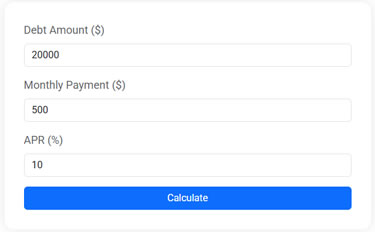Debt Management Made Easy: A Comprehensive Guide

Understanding and managing debt involves categorizing it into high-interest and low-interest types, knowing the total owed, interest rates, and minimum payments. Creating a budget helps allocate more funds toward debt repayment by listing income and cutting unnecessary expenses. Debt consolidation can simplify repayment by combining debts into a single loan with a lower interest rate, though it's important to research options carefully. Communicating with creditors can lead to revised payment plans or settlements if you're struggling. If debt becomes overwhelming, seeking help from credit counseling agencies or debt management companies can provide guidance and negotiation assistance.
Debt. It’s a four-letter word that can feel as heavy as a millstone around your neck. But managing debt doesn’t have to be a never-ending nightmare. With the right tools and strategies, you can turn the tables and take control of your financial life. Whether you're grappling with student loans, credit cards, or a mortgage, understanding the nuances of debt can make a world of difference. Think of this guide as your roadmap to a debt-free life, breaking down each step into manageable chunks. Grab a cup of coffee, and let’s dive into the ins and outs of debt management.
Now, I know what you’re thinking: “Debt management? Easier said than done!” But bear with me. By the end of this article, you’ll have a clearer picture of your financial landscape and the tools you need to tackle it. We’ll cover everything from categorizing your debts to communicating with creditors and even when to call in the professionals. Let’s get started on this journey to financial freedom.
Understanding Your Debt: The First Step
Before you can effectively manage debt, you need to understand the terrain. Start by categorizing your debt into high-interest and low-interest types. High-interest debts, like credit cards and payday loans, can quickly spiral out of control if left unchecked. On the other hand, low-interest debts, such as mortgages and student loans, often have more manageable terms.
Knowing exactly how much you owe is crucial. Make a comprehensive list of all your debts, including the total amount owed, interest rates, and minimum payments. This exercise not only gives you a clearer picture of your financial obligations but also highlights areas where you can make the most impact. As financial advisor Jane Smith puts it, "You can't manage what you don't measure."
Understanding your debt is like diagnosing a medical condition – it’s the first step towards finding a cure. And while it might be uncomfortable to face the numbers, it’s a necessary part of the process.
Creating a Budget: Your Financial Blueprint
Once you have a clear understanding of your debt, it’s time to craft a budget. A budget isn't just a list of numbers; it’s your financial blueprint. Begin by listing all sources of income and then outline your expenses. Pay special attention to identifying unnecessary expenses that can be trimmed or eliminated.
By reallocating funds from non-essential expenses, you can free up more money to put toward debt repayment. For instance, consider packing lunch instead of dining out or canceling that underused gym membership. These savings can drastically accelerate your journey to becoming debt-free.
Creating a budget might sound tedious, but think of it as setting the foundation for a solid financial future. As CNBC suggests, "A well-planned budget is like a compass – it helps you navigate the financial seas."
Debt Payoff Calculator
Plan your financial future by estimating how long it will take to pay off your debt based on your balance, annual percentage rate (APR), and monthly payment. After entering your figures, the calculator determines the number of months needed to fully repay the debt and calculates the total interest paid over time.
Debt Consolidation: Simplifying Repayment
If juggling multiple debts feels overwhelming, debt consolidation might be the solution. This strategy involves combining several debts into a single loan, ideally with a lower interest rate. Not only does this simplify your monthly payments, but it can also save you money in the long run.
That said, consolidation isn’t a one-size-fits-all solution. It’s important to research your options thoroughly. Look for reputable lenders and compare terms to ensure you’re getting a good deal. Remember, the goal is to reduce your financial burden, not add to it.
For example, a friend of mine managed to consolidate her credit card debts into a personal loan with a significantly lower interest rate. This move not only eased her financial stress but also allowed her to pay off her debts faster. As with any financial decision, weigh the pros and cons carefully before proceeding.
Communicating with Creditors: Don’t Stay Silent
If you’re struggling to keep up with payments, one of the most proactive steps you can take is to communicate with your creditors. Silence is not golden in this scenario. Many creditors are willing to work with you if they understand your situation.
Consider reaching out to negotiate revised payment plans or settlements. Some creditors might offer temporary forbearance or reduced interest rates. As financial expert John Doe notes, "Creditors prefer to get something rather than nothing. Open communication can lead to favorable outcomes."
Remember, being upfront about your financial struggles can prevent further damage to your credit score and provide you with some much-needed breathing room.
When to Seek Professional Help
Sometimes, despite your best efforts, debt can become too overwhelming to manage alone. That's when it's time to consider seeking help from credit counseling agencies or debt management companies. These professionals offer guidance and can negotiate on your behalf, helping to create a manageable repayment plan.
Before choosing an agency, do your homework. Look for accredited organizations with positive reviews and transparent fees. Avoid companies that promise quick fixes or charge exorbitant upfront fees. The National Foundation for Credit Counseling is a good place to start your search.
Enlisting professional help can feel like admitting defeat, but it’s actually a smart step towards regaining control. As the old saying goes, "Sometimes, asking for help is the bravest move you can make."
Debt management doesn’t have to be a solo endeavor. With the right strategies and support, you can conquer your debt and pave the way to a brighter financial future. Remember, every step you take, no matter how small, brings you closer to the freedom and peace of mind that comes with being debt-free. Here’s to your financial success!








